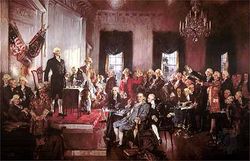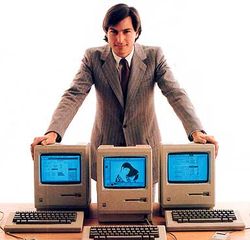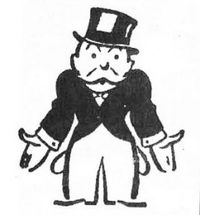
Mark Antony's funeral oration in Julius Caesar (whoever wrote it) is one of the great speeches in all of literature. It's designed to twist a crowd against their best interests, to win them to an empire against the republic, by laying a great man's acts for the common weal against the mere “principles” espoused by Brutus and Caesar's other killers.
Julius Caesar was the villain. Antony's speech is a lie. The tragedy of the play is the destruction of democracy at the hands of Antony and Octavius, who would become Caesar Augustus.
So now let me come to the late Steve Jobs, and patents.
Apple's latest patent, and the words of Jobs in his autobiography, make clear that his corporate aim is to own the smartphone market, through the legal system, for as long as demand for smartphones exists. What Microsoft took from him, through Windows, he bent his last energy to overthrow by having all Android phones ruled illegal, by taking them from the marketplace.
It's a direct assault against the heart of open source. And, I believe, a direct assault against the intent of patent and copyright.

To promote the Progress of Science and useful Arts, by securing for limited Times to Authors and Inventors the exclusive Right to their respective Writings and Discoveries;
The intent of patent and copyright is to promote the progress of science and art, to move it forward. The right – often called a “monopoly” in the Federalist Papers – is an individual one, not a corporate right, not a property right. We know this because they're expressly to be secured “for limited times.”
When a patent law, or a copyright, goes beyond this wording, it goes against the intent of the Founders. It stands against the Republic.

Steve Jobs believed fervently in intellectual property. So does Hollywood. So do all the copyright industries. By extending copyright into infinity, by making patents absolute, so they can't be invented around, they make corporations into kings, and the men or women who run them into Caesar.
It is this idea that we must, like Brutus, strike to its heart. And in this effort, it must be said, we stand against all the momentum of American law, going back decades, and all the momentum of American politics, which rides on the cash of companies like Apple and people like the late Mr. Jobs.
There are many great lawyers today who would use something like Antony's words to twist that principle into mere “ambition,” and by calling us “honorable” overthrow the Republic that has been our patent and copyright system.
We can't let them.

That's the question, it seems to me. It has been the central question ever since the Web was spun and the Digital Millenium Copyright Act (DMCA) , along with the State Street decision, became de jure and de facto law.
When my words can be endlessly, perfectly copied, at the speed of light, and live in 10,000 places, can the company controlling that copyright put a toll in front of them, that must be paid by all readers? Can I invent a better mousetrap, or can killing mice be protected by some corporation so that no new mouse trap might be produced?

“Had you rather Jobs were living and die all slaves, than that Jobs were dead, to live all free men?” Where Shakespeare gave Brutus the word Caesar, I have substituted that of the late Apple emperor.
My words are inadequate, as Brutus' were made inadequate to Antony's, but my cause is just. Tomorrow's authors and tomorrow's inventors must be free not only from tyrannical government, but from tyrannical ideas of corporate intellectual property.











I am surprisingly amazed with your post. Can’t believe i’m gonna find this information from you. Keep up the good work 🙂
I am surprisingly amazed with your post. Can’t believe i’m gonna find this information from you. Keep up the good work 🙂